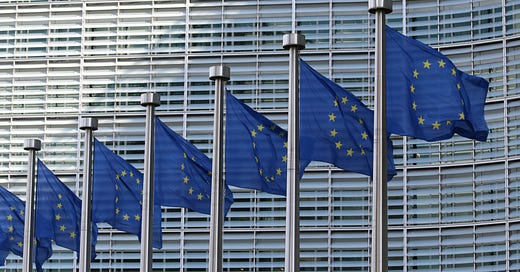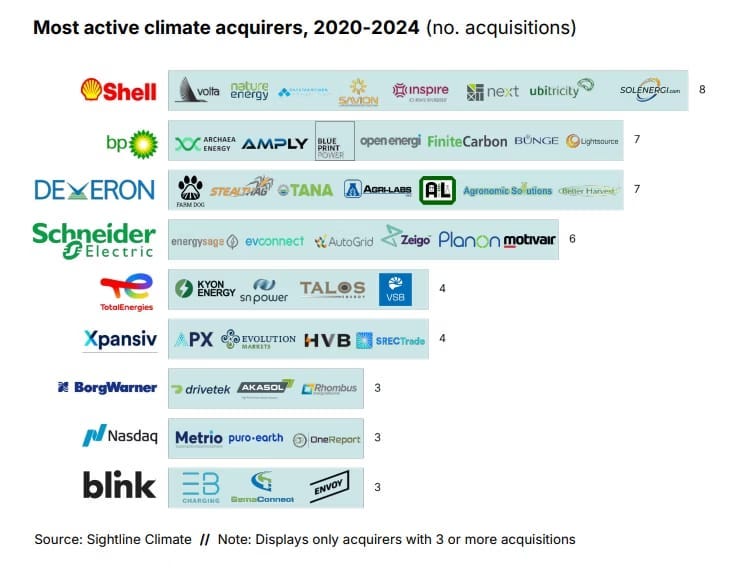Europe has a new ambition: to become the world’s economy where everything is designed, produced, and distribute for zero emissions.
That’s cool. But how does it plan to get there?
Well, this is the topic of this week’s story 👇️
A future built on three pillars
The Competitiveness Compass is a new strategic framework launched by the European Commission in January 2025.
It all started with this report.
The outcome is a political commitment to address three main European priorities for the years to come:
Innovation: supporting start-ups, deep tech, and AI adoption while simplifying legal frameworks.
Decarbonization: enhance competitiveness through decarbonization, affordable energy, and circular models.
Security: reduce dependencies, create new trade partnerships and procurement policies to secure critical resources and strengthen supply chains.
Climate is still in the discourse, but it’s not the only priority anymore. It’s now part of a set of pressing problems.
Europe can’t thrive (or even survive) just by greenlabelling everything. It has to rethink its economy to withstand the ferocious competition for tech, talent, and resources.
In the words of the Commission, it needs to close the gap in productivity growth to sustain its climate transition, restoring its appeal as a global industrial hub for the manufacturing industry while promoting alternative and cleaner business models.
Reshuffle (?)
The new European Compass inaugurates a shift toward integrated industrial-climate initiatives, the enablers to build the foundations of a climate-neutral economy.
It’s still early to see how this will play out, but these are the main trends to watch in the light of an accelerated European clean growth:
Reduced regulatory burden: less paperwork (especially for SMEs) and more action to allow faster approvals and deployments of projects (e.g., streamlined permitting).
New financing mechanisms: stronger initiatives/funds focused on financing R&D projects and helping clean tech companies take off.
Next-level EU cooperation: the EU’s 27s will need to enhance their policy cooperation on energy matters, especially in infrastructure development.
Redirection of existing funds: funds mobilized for previous programs like the NextGenerationEU could be redirected towards other projects focused on energy infrastructures and decarbonization.
Upskilling and job creation: the creation of a Union of Skills will be another cornerstone of the Compass, aiming to reduce the digital skills gap and strengthen STEM education.
The Clean Industrial Deal (CID) will define the next steps of the Compass to reconcile industrial competitiveness with climate neutrality.
Carpe diem
If we look out the window, things don’t look rosy for Europe.
The new US administration is reconsidering its previous commitment in terms of guarantor of EU security, and as China's capabilities grow so does its potential threat to European interests (but it’s keeping the door open).
Europe now has the opportunity to become a main, independent player, although this will happen only at the cost of reforming its Single Market.
The question now is: does the EU have the political will to make it happen?
It’s definitely time to step up the game 🇪🇺
The atom powerhouse ⚛️
France keeps working and investing in its nuclear capacity, despite recent political turmoils. It is now in talks with India and Japan to develop and deploy advanced nuclear reactors.
France nuclear power generation, source: Our World in Data
Batteries like seeds 🌱
Battery tech companies are growing!
VCs and private investors are writing checks to companies building in this space, and public finance is following.
In December 2024, the European Commission and EIB announced €200 million to support electric vehicle battery cell manufacturing projects.
Jessica Burley from Planet A wrote a great post on the topic and shared the names of cool companies to follow in the European space.
I’m buying it! 🧐
Oil & gas companies have been the most active acquirers of climate tech startups so far 👇️
Source: Sightline Climate
Junction has closed a €115 million fund 💸
The fund targets scale-ups in series B or later rounds, but it can also include SMEs.
Some of the climate verticals they are into: are grid-enhancing technologies, B2B installers, sustainable buildings, (home) energy management systems, and industry decarbonization.
The investment tickets are €2M-15M.
Link to the original post: https://tctb.co/p/the-european-way









